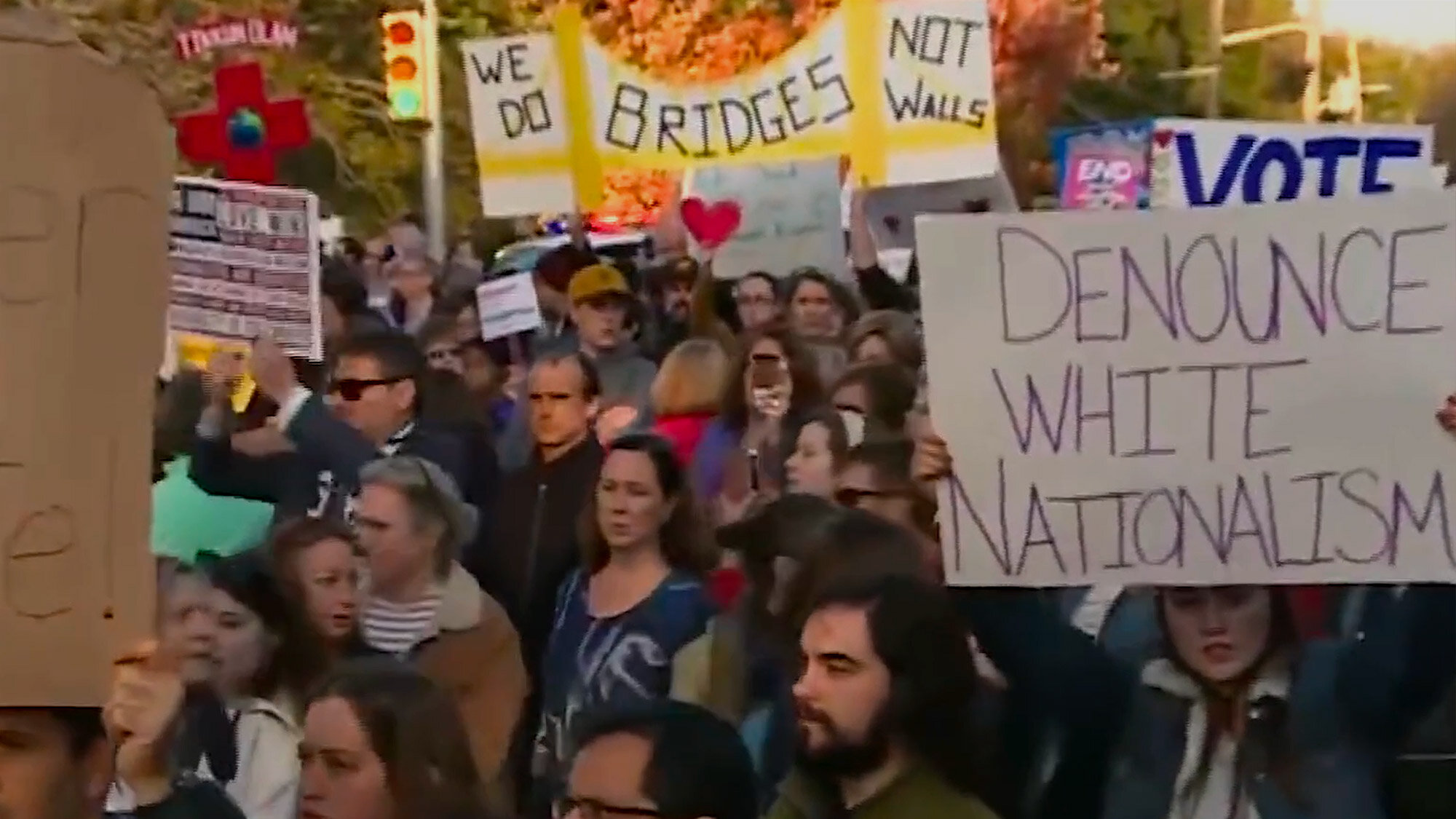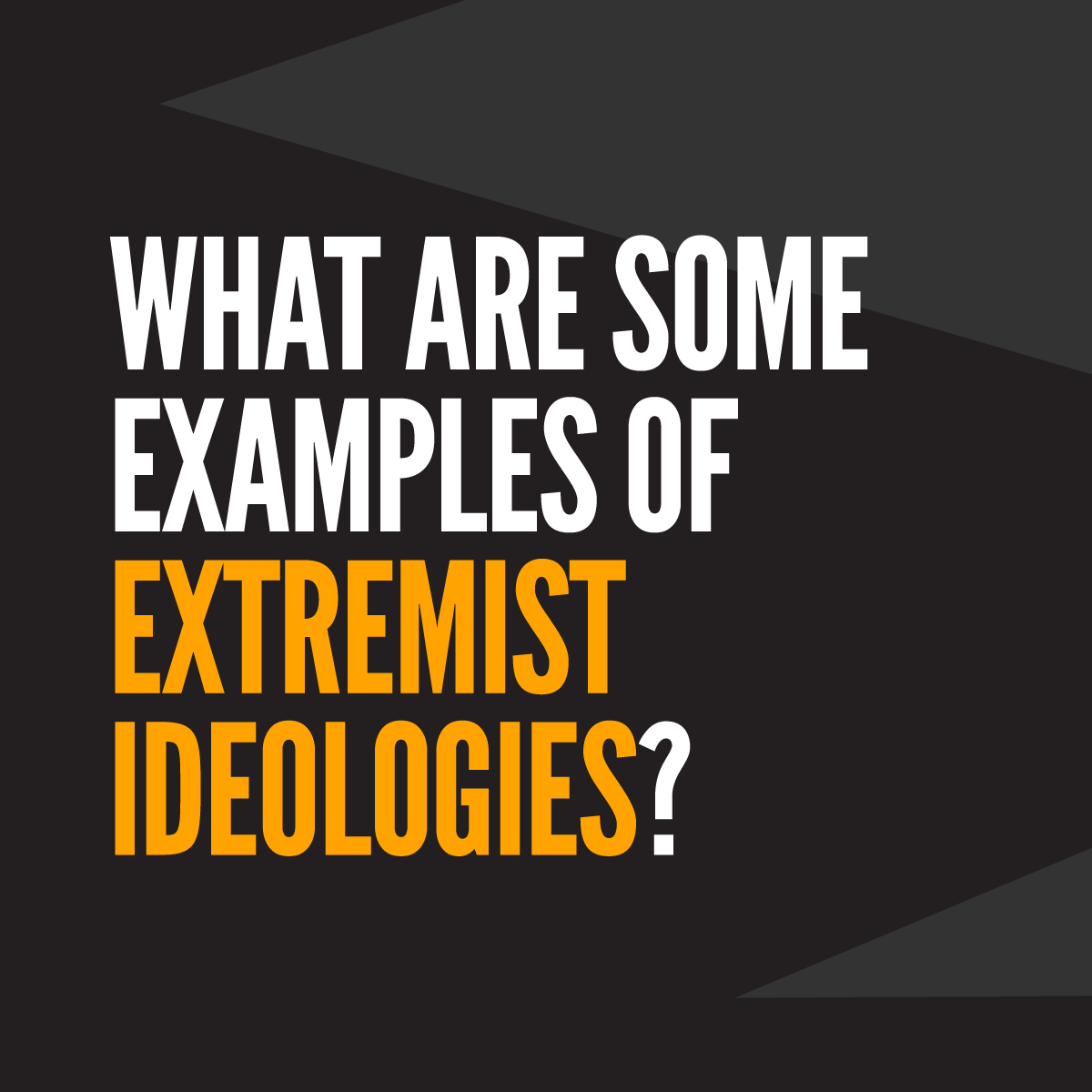
Understanding Hate and Extremism
How do hate groups operate and what are the false and dehumanizing ideologies they are spreading? Identifying the messaging of hate can help individuals and communities counter it when it appears on social media or in public interactions.
The Southern Poverty Law Center (SPLC) and the Anti-Defamation League (ADL) provide extensive resources on hate and extremist groups in the U.S. The Eradicate Hate Global Summit convenes experts from around the world to discuss the impact of extremism and hate and seek solutions that can counter hate violence.
This page includes resources from the SPLC and the ADL. SPLC’s Hate Map shows where hate groups are active in local communities and their resources outline the ideologies that drive these groups. Learn more about hate symbols and the impact of extremist groups from ADL’s Center on Extremism.
“Hate groups vilify others because of their race, religion, ethnicity, sexual orientation or gender identity—prejudices that strike at the heart of our democratic values and fracture society along its most fragile fault lines.” -The Southern Poverty Law Center
Defining Hate and Extremism
Featuring excerpts from the Southern Poverty Law Center.
“The Southern Poverty Law Center defines a hate group as an organization or collection of individuals that—based on its official statements or principles, the statements of its leaders, or its activities—has beliefs or practices that attack or malign an entire class of people, typically for their immutable characteristics. An organization does not need to have engaged in criminal conduct or have followed their speech with actual unlawful action to be labeled a hate group. We do not list individuals as hate groups, only organizations.” -SPLC
“Yes. In fact, it’s even more important to call out groups that demonize others while having a foothold in the mainstream. It’s easy to recognize the hater in a white sheet and pointy hat for what they are. It’s the wolf in sheep’s clothing that’s harder to identify. A wolf doesn’t always see themselves as a wolf and the SPLC works to identify these actors and this trend, and to ensure that the public is aware of the efforts to mainstream hate and antigovernment extremism.”-SPLC
The SPLC identifies further examples of extremist groups than the examples below. The definitions of each group are excerpted from the SPLC’s website, to learn more visit www.splcenter.org.
White-Nationalist: “White nationalist groups espouse white supremacist or white separatist ideologies, often focusing on the alleged inferiority of nonwhite persons. Their primary goal is to create a white ethnostate. Groups listed in a variety of other categories, including Ku Klux Klan, neo-Confederate, neo-Nazi, racist skinhead and Christian Identity, could also be fairly described as white nationalist.”
Neo-Confederate: “Neo-Confederacy is a reactionary, revisionist branch of American white nationalism typified by its predilection for symbols of the Confederate States of America, typically paired with a strong belief in the validity of the failed doctrines of nullification and secession—in the specific context of the antebellum South—that rose to prominence in the late 20th and early 21st centuries.”
Anti-Government General: “Antigovernment groups are part of the antidemocratic hard-right movement. They believe the federal government is tyrannical, and they traffic in conspiracy theories about an illegitimate government of leftist elites seeking a “New World Order.” In addition to groups that generally espouse these ideas, the movement is comprised of sovereign citizens, militias, overt conspiracy propagandists and constitutional sheriff groups. In the past this movement was referred to as the “Patriot” movement by adherents and critics.”
Holocaust Denial: “Deniers of the Holocaust, the systematic murder of 6 million Jewish people in World War II, either deny that such a genocide took place or minimize its extent. These groups and individuals often cloak themselves in the sober language of serious scholarship, call themselves “historical revisionists” instead of deniers and accuse their critics of trying to squelch open-minded inquiries into historical truth.”
Addressing Extremism
The Southern Poverty Law Center
Above: A screenshot of The Southern Poverty Law Center’s Hate Map
Hate Map
The Southern Poverty Law Center is currently tracking more than 1,300 extremist groups that are operating across the United States. You can see where these groups are active on their interactive Hate Map (pictured).
Extremist Files
The Extremist Files is a database that contains profiles of prominent extremists and extremist organizations. It also examines the histories and core beliefs—or ideologies—of the most common types of extremist movements.
ADL (Anti-Defamation League)
Center on Hate and Extremism
The ADL’s Center on Extremism tracks trends, ideologies, and groups. Their staff aims to expose and disrupt threats from these groups.
This interactive map provides details on specific incidents of hate, extremism, antisemitism and terrorism, and allows users to better understand extremist tactics, compare activity by type and/or state and access and download raw data.
An extensive database of many of the symbols frequently used by white supremacists, anti-government extremists and other hate groups. Learn to recognize the signs of hate.
Covering Hate
ProPublica and Frontline Documentaries on Hate Groups
ProPublica Reporter and renowned journalist A.C. Thompson who appears in Repairing the World: Stories from the Tree of Life has followed the rise of hate groups for many years. His Frontline films uncover the workings of violent white supremacists.
Documenting Hate (2:26) [film clip]
“In the wake of Charlottesville, FRONTLINE and ProPublica journeyed deep into America’s shadowy white supremacist movement, exposing some of its most influential leaders and an underground neo-Nazi network.”
Documenting Hate: New American Nazis (53:26)
[full documentary]
“FRONTLINE and ProPublica present an investigation into white supremacist groups in America – in particular, the neo-Nazi group, Atomwaffen Division. This joint investigation shows the group’s terrorist objectives and how it gained strength after the 2017 Charlottesville rally.”
Eradicate Hate Global Summit
Eradicate Hate Global Summit Statement of Purpose
“The Eradicate Hate Global Summit was born out of the October 2018 massacre at Pittsburgh’s Tree of Life Synagogue. It brings together multi-disciplinary global experts and leaders who are committed to the global eradication of all forms of hate speech and violent extremism. A distinguishing feature of the Summit is that it goes beyond dialogue in the collective pursuit of solutions by uniting experts and leaders from around the globe. The Summit incentivizes experts to work collaboratively across disciplines, across institutions, and across borders between each annual gathering, to deliver actual, lasting, and measurable change.”
Eradicate Hate video library
What You Can Do
How do we begin as a society to counter this? It starts with changing social norms—the way we speak to each other in public, at school, and in our neighborhoods and workplaces. As the community of Pittsburgh showed, it starts with all of us.
Host a Screening Event In Your Community
Screening events drive home the clear message from the Pittsburgh community that safety, solidarity and resilience start with relationships, collaboration and action. The events are a vehicle to bring diverse residents and community stakeholders together under the rubric of engagement, trust-building, and joint action against antisemitism and all forms of hate and bigotry. Post-screening panel discussions can explore how cities, faith groups, schools, civil rights groups and local businesses can work together to foster inclusion and broader civic participation.
Get our Discussion Guide and other resources for hosting a screening →
Other Ways to Take Action
Get your school involved
Plan a screening and discussion of the film and how to stop hate and antisemitism. Begin now with a Not In Our School campaign to empower students to create safe and inclusive environments: niot.org/nios/about
Share your story
Hundreds of communities came together for vigils and events in response to the attack at Tree of Life synagogue in 2018. Share your own videos, photos, and stories about what happened in your town by sending us a message at info@niot.org. Your town may be featured on this site and on NIOT.org.







